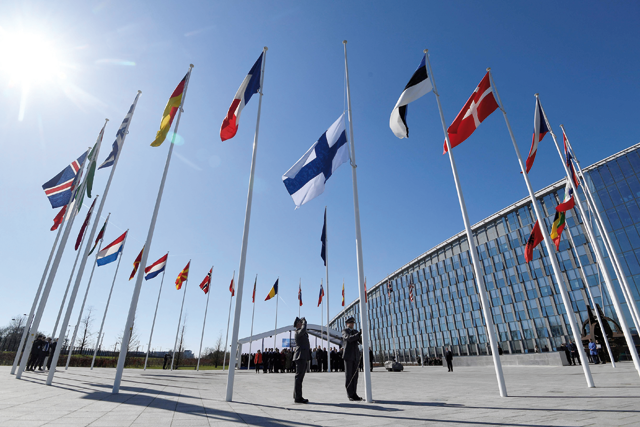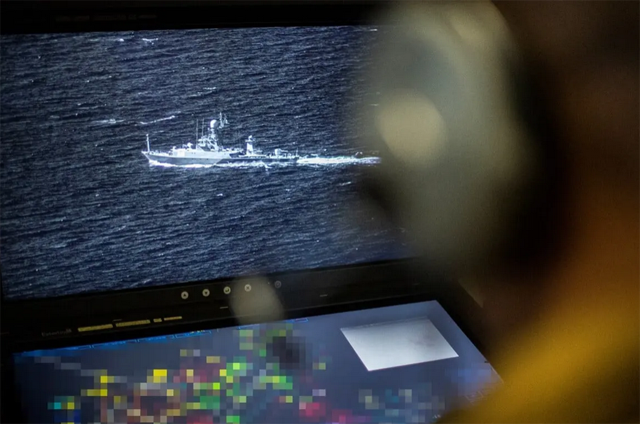You are here
Former PM Stubb wins Finland presidential election
By AFP - Feb 11,2024 - Last updated at Feb 11,2024
HELSINKI — Former conservative prime minister Alexander Stubb won Sunday's Finnish presidential election, after rival Pekka Haavisto conceded with nearly all of the votes counted.
Some 4.3 million voters were choosing between Stubb and former foreign minister Pekka Haavisto, a Green Party MP running as an independent.
"Well, Alexander. Congratulations to Finland's 13th president," Haavisto told Stubb on live television, as the results of broadcaster Yle's prognosis gave Stubb the win with 51.4 per cent of the vote.
The official count meanwhile gave Stubb 51.7 per cent of the vote with over 98 per cent of ballots counted.
"This is the greatest honour of my life," Stubb said after Haavisto conceded.
The changing geopolitical landscape in Europe will be the main challenge for the new head of state, who — while having limited powers compared to the prime minister — guides the country's foreign policy together with the government and acts as supreme commander of Finland's armed forces.
Relations between Moscow and Helsinki deteriorated following Russia's 2022 invasion of Ukraine, prompting Finland to drop decades of military non-alignment and join NATO in April 2023.
Russia, with whom Finland shares a 1,340 kilometre border, swiftly warned of "countermeasures".
"The fact that we've just joined NATO has a lot of significance because the building of the NATO institution in Finland and what it will look like will largely be a task for the new president," Theodora Helimaki, doctoral researcher in political science at the University of Helsinki, told AFP.
"The International political situation is really demanding for us at the moment and I think we really need a president who can work with different political parties and who can negotiate," 46-year-old doctor Maarit Tarkiainen told AFP in Helsinki.
Stubb came out ahead in the first round on January 28 with 27.2 per cent of votes, while Haavisto came in a close second with 25.8 per cent of the vote — qualifying them for the second round.
An opinion poll by public broadcaster Yle published on Thursday showed Stubb with 54 per cent of the vote, compared to 46 per cent for Haavisto.
In the post-Cold War period, Helsinki maintained good relationships with Moscow.
Outgoing President Sauli Niinisto, first elected in 2012, once prided himself on his close ties with Russian leader Vladimir Putin before becoming one of his most trenchant critics.
Niinisto contacted him directly to announce the decision to join NATO.
Since then, there has been radio silence and Sunday’s winning candidate won’t be expecting a phone call from the Kremlin.
In August 2023, Finland observed an influx of migrants entering through its eastern border without visas.
Helsinki claimed Moscow was pushing the migrants to destabilise it, and in response closed their border in November — a move supported by both candidates.
Stubb and Haavisto, who have both served as foreign minister, shared similar visions for the country’s position towards Russia, calling for additional sanctions against Moscow and support for Ukraine.
Nuclear arms
For Helimaki, the differences between the candidates came down to nuance on certain issues, such as the storage or transport of nuclear weapons in Finland.
Haavisto doesn’t want them on Finnish soil though he recognised that as a member of NATO, the Nordic country must take part in exercises relating to the alliance’s nuclear policy.
Stubb meanwhile argued that the country should not exclude “any part” of NATO’s nuclear deterrence.
Given their similarities, voters likely made their decision based on their political preferences, according to Matti Pesu, leading researcher at the Finnish Institute of International Affairs.
“While Stubb’s liberalism is related to Western organisations and Western values, Haavisto has more of a global emphasis: The UN, peace, development,” Pesu told AFP.
Related Articles
BRUSSELS — Finland became the 31st member of NATO on Tuesday, in a historic realignment of Europe's defences that drew an angry warning of "
HELSINKI — Finnish President Sauli Niinisto spoke with his Russian counterpart Vladimir Putin on Saturday about the Nordic country's applica
STOCKHOLM — Sweden on Sunday said that it would contribute up to three warships and a surveillance aircraft to monitor critical infras

Opinion
Apr 09, 2025
Apr 08, 2025
- Popular
- Rated
- Commented
Apr 08, 2025
Apr 09, 2025
Newsletter
Get top stories and blog posts emailed to you each day.

















